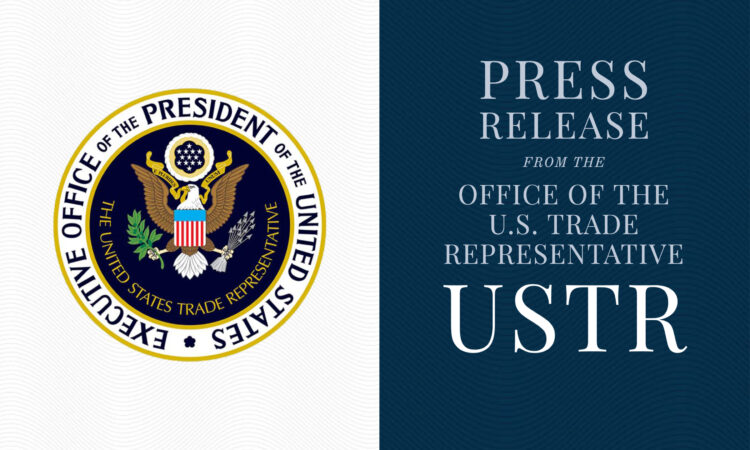The U.S. Trade Representative (USTR) released a report on January 16th, Eastern Time, accusing China of “unfairly dominating” the global shipping, logistics, and shipbuilding markets. The report highlights potential actions under U.S. trade law to address these concerns. USTR warned that the funding of China’s state-owned entities and the reliance on Chinese-built ships owned by Chinese shipping companies for U.S. international trade represents a dependency on Beijing-controlled shipping and logistics infrastructure.
Photo courtesy= USTR
Katherine Tai, the U.S. Trade Representative, pointed out that the U.S. ranks 19th globally in commercial shipbuilding, constructing fewer than five ships annually, compared to China’s output of over 1,700 vessels. She criticised Beijing’s targeted control of these sectors, stating it undermines fair, market-driven competition, heightens economic security risks, and poses significant challenges to the recovery of U.S. industries and communities.

Section 301 of the U.S. Trade Act permits sanctions against countries engaged in unfair trade practices if bilateral consultations fail. USTR noted that specific measures stemming from the investigation would be considered in the next phase, leaving decisions to the incoming Trump administration, which takes office on January 20th.
The investigation was initiated in March last year following a request by five U.S. labour unions representing sectors including steel, energy, and shipbuilding. In 2024, Chinese shipyards accounted for an overwhelming 75% share of global newbuild orders. USTR highlighted the adverse effects on U.S. shipbuilding, citing offshore wind support vessels as an example. Despite strong domestic demand for offshore wind energy, few such vessels are under construction in the U.S. Chinese-built turbine installation vessels are reportedly 25% cheaper than their American counterparts.
According to the Economic Policy Institute, Chinese shipyard workers earn an average annual wage of $16,040, compared to $67,140 for U.S. shipyard workers, whose jobs are protected by higher labour, safety, and environmental standards.
The report also documented unfair practices in shipping, including an incident where Brazilian mining giant Vale’s large ore carriers were banned from Chinese ports and eventually sold to Chinese shipping firms and banks. In logistics, the Chinese government-backed platform LOGINK was accused of “dominating the global market and hindering fair, competitive development.” As of 2023, LOGINK held a 40% market share, making it a dominant player worldwide.
Key Findings of the USTR Investigation
China’s practices were deemed unreasonable on several counts:
- Excluding foreign firms and depriving market-driven enterprises and their workers of commercial opportunities.
- Increasing dependency on China while reducing competition, raising risks, and undermining supply chain resilience.
- Exercising excessive control over economic entities and sectors.
These practices have adversely impacted U.S. trade by:
- Limiting business opportunities and investment in U.S. shipping, logistics, and shipbuilding.
- Curtailing competition and consumer choice.
- Increasing economic security risks and supply chain vulnerabilities.
U.S. labour unions have raised alarms about China’s growing dominance, warning that “U.S. international trade is increasingly reliant on vessels built in China, financed by Chinese state-owned entities, and owned by Chinese shipping companies, further entrenching dependence on a Beijing-controlled global shipping and logistics infrastructure.”
〆米通商代表部、中国の造船分野に「市場支配は不当」。調査報告書を発表。
米通商代表部(USTR)は米国東部時間2025年1月16日、中国が世界の海運・物流・造船市場を「不当に支配」しており、「米通商法に基づく措置が可能」とする調査報告書を発表した。USTRは「中国の国有機関が資金を提供し、中国の海運会社が保有する中国建造の船で米国の国際貿易が行われることは、中国が優位に立つ海運・物流インフラへの依存を意味する」と警鐘を鳴らしている。
USTRのキャサリン・タイ代表は「現在、米国は商船の建造で世界19位であり、年間5隻以下しか建造していない。一方、中国は1700隻以上を建造している」と指摘。
その上で「北京政府によるこれらの分野を標的とした支配は、公正で市場原理に基づく競争を損ない、経済安全保障上のリスクを増大させ、米国の産業と地域社会の再生の最大の障害となっている」と強く非難した。
米国の通商法301条は、不公正と判断された貿易に対して、相手国と協議し、解決できない場合には制裁措置を発動できることを定めている。
USTRは今回の調査結果に基づく措置について「後日、調査の次の段階で検討される」とし、20日に発足するトランプ政権に委ねられることになった。
今回の調査は昨年3月に提起された、米国の鉄鋼、エネルギー、造船などの5つの労働組合による要請を受けて実施された。
2024年の世界の新造船受注量で中国造船業はシェア75%と圧倒的な地位を占めた。USTRは米国造船業への悪影響として、洋上風力発電支援船を例に挙げ、「米国内での洋上風力の強い需要の兆しにもかかわらず、米国で建造中の船はほとんどない」と指摘。中国製の洋上風車設置船は「米国での建造船よりも25%安価」との調査結果を示している。
米経済研究所の推定によると、中国の造船所労働者の平均年収は1万640㌦(約170万円)。一方、米国の造船所労働者の年収はほぼ6倍の6万7140㌦(約1040万円)に達し、「より公正な労働、安全、環境基準によって保護されている」(USTR)。
このほか海運分野での不当な行為として、ブラジル資源大手ヴァーレの大型鉱石船が中国港湾への入港を禁じられ、最終的に中国の海運会社と銀行への売却を強いられたケースも示している。
物流分野では中国政府が支援する物流サービスプラットフォーム「LOGINK」が「世界を支配し続け、公正で競争力のある発展を妨げている」と非難。23年時点で、LOGINKの市場シェアは約40%に達し、世界市場で支配的な企業となっているという。
調査の主な結果
USTRの調査により、中国の取り組みは以下の点で不合理とされた:
- 外国企業を排除し、市場志向の企業およびその労働者から商業的機会を奪う。
- 競争を減少させることで中国への依存を生み、リスクを増大させ、サプライチェーンの回復力を低下させる。
- 中国政府が経済主体やセクターを異常にコントロールしている。
これらの取り組みにより、米国通商には以下の影響が生じている:
- 米国の海運、物流、造船業セクターへのビジネス機会や投資が妨害される。
- 競争や選択肢が制限される。
- 経済的安全保障リスクが増加し、サプライチェーンの脆弱性が高まる。
米国労働組合は、中国の支配が進むことで“米国の国際貿易は、中国で建造され、中国の国有金融機関が資金提供し、中国の海運会社が所有する船舶によって支えられ、さらに中国が支配するグローバルな海運・物流インフラに依存する”状況が生まれると警鐘を鳴らしている。
